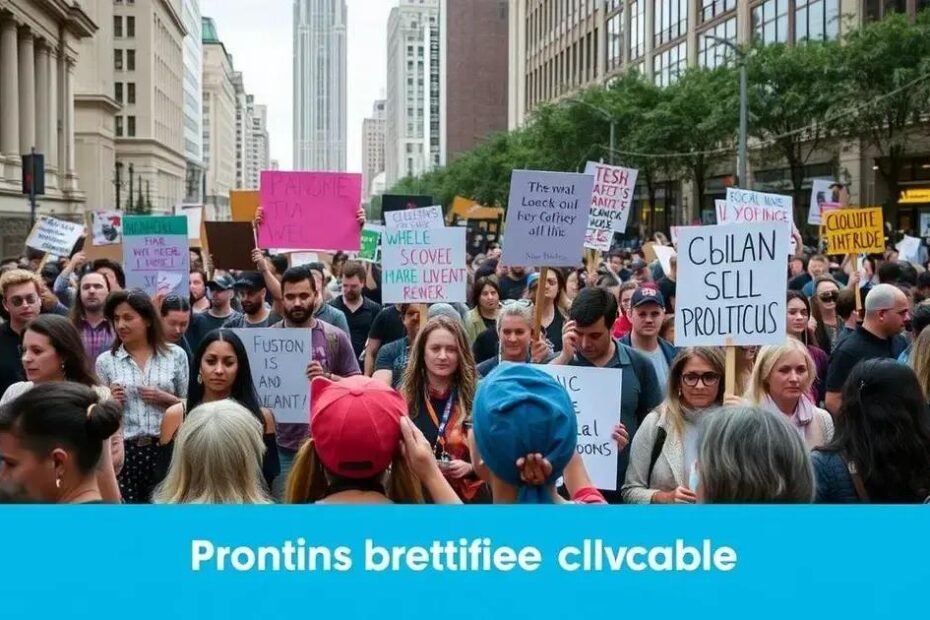The international backlash over U.S. political protests reveals significant impacts on global perceptions, influencing foreign relations, highlighting systemic injustices, and igniting diverse reactions from activists worldwide.
International backlash over U.S. political protests has stirred global conversations, highlighting concerns about democracy and governance. Have you noticed how these events are being perceived internationally?
Understanding the roots of U.S. political protests
In recent years, the roots of U.S. political protests have become a focal point of national and international debate. Understanding why people take to the streets is essential to grasp the larger issues at play.
The triggers of these protests often stem from deep societal grievances. Economic inequality, racial injustice, and police brutality have united individuals from various backgrounds. Factors such as these fuel the passion and urgency seen in protests across the nation.
Historical context
Looking back, many movements have shaped the landscape of U.S. political protests.
- The Civil Rights Movement challenged systemic racism.
- Anti-war protests highlighted dissent during the Vietnam War.
- Environmental activism raises awareness for climate change.
- More recent movements focus on social justice and systemic reform.
These historical events create a framework for understanding current protests. They remind us that protest is often a response to perceived injustice and a call for change.
Social Media’s Role
Today, social media plays a pivotal role in organizing protests. Hashtags and online campaigns can mobilize people swiftly, as seen with movements like Black Lives Matter. This immediate connectivity amplifies messages and raises awareness effectively.
The international backlash often stems from these protests as well. Global audiences can view events in real-time, provoking reactions that reflect various political climates worldwide. This simultaneous communication can sometimes lead to misunderstandings or misinterpretations of events.
As we navigate through these layers of history, today’s protests become not only events in themselves but also reflections of decades of struggle for rights and recognition. The dynamic nature of these movements highlights a relentless pursuit of justice.
Global reactions: what the world thinks
The global reactions to U.S. political protests reveal a complex mix of opinions from various countries. Around the world, many people are closely watching how these events unfold, and their perspectives are shaped by local contexts and experiences.
Countries with their own histories of protest and civil rights movements often resonate with the issues at hand. For instance, many European nations have expressed solidarity with movements like Black Lives Matter, recognizing the parallels in their own struggles against racism and injustice.
Media Coverage
The media plays a crucial role in shaping global perceptions. Reports from international news outlets often influence how protests are viewed outside of the U.S. This coverage can vary significantly, offering both supportive and critical angles.
- Some media highlight the importance of peaceful protests.
- Others focus on instances of violence or unrest.
- Many emphasize the demands for policy changes.
- A few provide platforms for voices from within the protest movements.
These narratives can affect diplomatic relations and how countries perceive each other, complicating international discourse.
Diverse International Responses
Different countries have their own responses to the U.S. protests. For example, leaders in authoritarian regimes may use these protests as a reason to justify their actions against dissent at home. In contrast, democratic nations might offer support for the values of free expression and assembly, championing the protestors’ rights.
The varying international reactions also point to a global dialogue about governance, rights, and social justice. Countries are more interconnected today, and how one nation’s protests are perceived can influence international relations and support networks.
In this context, the U.S. protests serve not only as a national issue but as a touchpoint for a global audience, highlighting the universal nature of the calls for justice and equality. Observers from Japan to Brazil are engaging in discussions, analyzing these events through their own political lenses.
Effects on U.S. foreign relations

The effects on U.S. foreign relations due to political protests are profound and multifaceted. As these protests capture global attention, they prompt reactions from both allies and adversaries alike. International opinions about the U.S. are often influenced by how these events are portrayed in the media.
Countries closely observing the situation may adjust their diplomatic strategies based on the actions and policies of the U.S. government. For instance, nations that experience similar social justice movements might seek to bolster relations with the U.S., supporting shared values of democracy and human rights.
Shifts in Alliances
Political protests can lead to shifts in alliances. When the U.S. is perceived as upholding democratic values, countries tend to lean closer to its side. Conversely, if protests reveal systemic issues, it may weaken its standing among allies.
- Countries may criticize the U.S. for its internal conflicts.
- Some nations might use protests to distance themselves from U.S. policies.
- Other countries may express unity and solidarity.
- Negotiations might shift based on perceived stability.
These dynamics can create a ripple effect throughout international relations, changing how treaties and agreements are viewed.
Global Perception and Influence
Furthermore, U.S. protests shape the narrative of American influence worldwide. The nation’s ability to manage dissent is closely monitored. How the U.S. handles these protests can either enhance or damage its image as a leader in advocating for human rights.
Other nations might draw lessons from the U.S. experience regarding governance and activism. The way protests are dealt with can serve as a model, either positively or negatively, for nations grappling with their domestic challenges. Thus, the outcome of these protests can reverberate through international platforms.
As protests continue, the U.S. faces a challenge in balancing its internal struggles with its role in global leadership. Foreign nations will be watching closely, ready to shape their responses based on the evolving situation.
Voices of dissent: international perspectives
The voices of dissent from around the world provide a rich tapestry of international perspectives on U.S. political protests. As people globally witness these events, many feel compelled to voice their thoughts, reflecting both solidarity and criticism.
In various countries, activists and leaders express their opinions through social media, articles, and public speeches. Observers highlight the importance of protest as a means of expressing discontent with systemic issues. The widespread access to information allows voices from diverse backgrounds to contribute to the conversation.
Global Activism
Many international movements inspire or parallel U.S. protests. Activists advocate for issues such as human rights, climate change, and racial equality. These connections create a sense of shared struggle. Nations with similar histories of civil rights movements often find common ground.
- Countries like France have a history of protests against inequality.
- South Africa’s anti-apartheid movement resonates with U.S. civil rights issues.
- Brazilian activists rally against corruption, drawing parallels to U.S. governance.
- European nations amplify calls for social justice and equality.
This interconnectedness emphasizes how dissent can truly be a universal language, leading to global dialogues about justice.
Critiques and Support
While many support the spirit of U.S. protests, some voices offer critiques. Certain governments may seize upon unrest to question the stability of U.S. democracy. Authoritarian regimes might highlight protests as a warning against dissent in their own nations.
These reactions can be double-edged. On one hand, they show awareness of global issues; on the other hand, they may misrepresent the values at stake. It’s crucial to engage with these critiques to understand the broader implications for international relations.
The international perspectives on U.S. protests play a significant role in shaping narratives and influencing public opinion. As these voices mix in the global discourse, they provide insights that not only reflect empathy but also the lessons learned from historical struggles.
Potential consequences for U.S. democracy
The potential consequences for U.S. democracy stemming from current political protests are significant and wide-ranging. As citizens express their frustrations and demand change, the impact of these demonstrations can shape the future of governance in the nation.
Protests often highlight underlying issues, such as inequality and injustice. When ignored, these issues can erode trust in democratic institutions. As citizens feel unheard, some may resort to more extreme measures, which could further destabilize the political landscape.
Increased Polarization
One of the notable consequences is increased polarization among citizens. As protests divide opinion, people may retreat into echo chambers where dissenting views are rejected. This polarization makes constructive dialogue challenging.
- Political divisions grow as groups take strong stances.
- Media narratives can fuel misinformation.
- Trust in institutions may decline as opposing sides blame each other.
- Social cohesion could be threatened, leading to further unrest.
Such divisions threaten the foundational principles of democracy, making consensus harder to achieve.
Legal and Policy Changes
Protests can also lead to legal and policy shifts. As demands for reforms gain momentum, lawmakers may feel pressured to respond. This can result in significant changes to laws that govern social justice, policing, and civil rights.
However, these changes can provoke backlash, especially from groups that resist reform. The cycle of protest and counter-protest can lead to an environment where political action becomes reactive rather than proactive.
What happens in the wake of protests is crucial. If responses to discontent fail to address root causes, the cycle of protest may continue. Strong leadership is required to navigate these turbulent times while balancing the diverse needs of the population.
The interplay between protests and democratic stability reveals the delicate balance that must be maintained. Understanding the implications for U.S. democracy is essential for citizens and leaders alike. As the nation moves forward, the lessons learned from these protests may guide future actions and decisions.
current political protests in the U.S. resonate with many around the globe, highlighting issues of injustice and equality. As these events unfold, they not only impact local communities but also influence international relations. Understanding how protests affect democracy is crucial for citizens and lawmakers alike. The conversations and reflections on these movements are essential for maintaining a healthy democratic society. Together, we can learn from these challenges and push for positive change in governance and civil rights.
FAQ – Questions about the International Backlash over U.S. Political Protests
What are the main issues highlighted by the protests?
The protests emphasize issues like racial injustice, economic inequality, and police brutality, calling for systemic changes.
How do international perspectives affect U.S. protests?
International reactions can influence how protests are perceived globally, reflecting support or criticism based on local contexts.
Can protests lead to changes in U.S. laws?
Yes, protests often pressure lawmakers to address public grievances, potentially leading to new regulations and reforms.
What is the impact of polarization on democracy?
Increased polarization can hinder constructive dialogue and trust in democratic institutions, complicating the ability to reach consensus.

